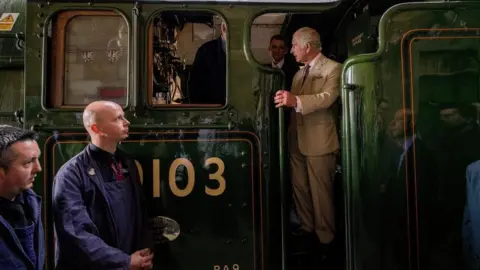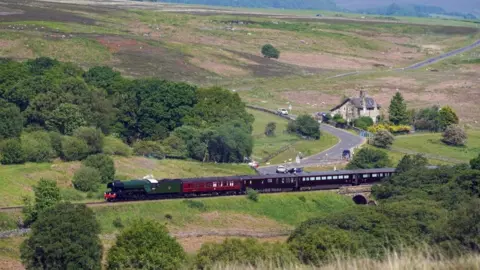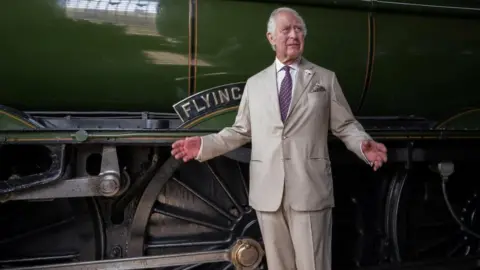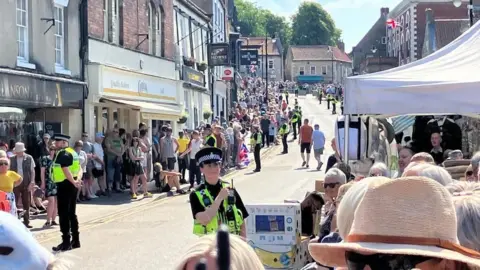King Charles takes to Flying Scotsman's footplate on North Yorkshire visit
 Reuters
ReutersKing Charles has been greeted by crowds in North Yorkshire after arriving on the Royal train which was pulled by the famous Flying Scotsman locomotive.
The King stopped off at Pickering station, on the North Yorkshire Moors Railway, to meet those involved with the loco as it marks its centenary.
The volunteer-run heritage railway is also celebrating its 50th anniversary.
The King spent time talking to people on the platform before moving to the town's square to meet shop owners.
At Pickering Heritage Railway Station, he met people who have worked with the Flying Scotsman, including Lord Hendy of Richmond Hill and Judith McNicol, director of the National Railway Museum in York, where the steam train is kept.
Despite wearing a light-coloured suit, the royal visitor accepted an invitation from the crew, including driver Chris Cubitt, to climb on board the footplate as the Royal train was pulled into the station.
 PA Media
PA MediaThe Flying Scotsman was retired from regular service in 1963 after covering at least two million miles during its service on Britain's railway network.
The 70ft (21m) long locomotive was one of Sir Nigel Gresley's A1 Class locomotives and is now considered one of the most famous in the world.
It was officially the first locomotive to reach 100mph (161 km/h) and on 24 February this year it marked 100 years since it entered service.
Chris Cubitt, the Flying Scotsman's driver, said the King had "enjoyed the trip".
"He's a regular because he has been here before when he opened the station in 2000.
"He's on his way to Scarborough now through my village. I invited him in for tea, but he said he couldn't come."
 PA Media
PA MediaAfter leaving the station in Pickering, the King was greeted by hundreds of well-wishers as he worked his way through the centre of the town on an extended walkabout during which he met several shop owners.
He also asked many of the schoolchildren who had gathered to see him whether they had enjoyed their recent half-term break.
The King is later expected to visit the town's St Peter and St Paul's Church, which is famous for its a collection of medieval wall paintings.
The frescoes, which were painted in the 1400s, are considered an example of how churches may have looked in the Middle Ages.
 Reuters
Reuters Reuters
Reuters Reuters
Reuters Phil Bodmer/BBC
Phil Bodmer/BBC
Follow BBC Yorkshire on Facebook, Twitter and Instagram. Send your story ideas to [email protected].
